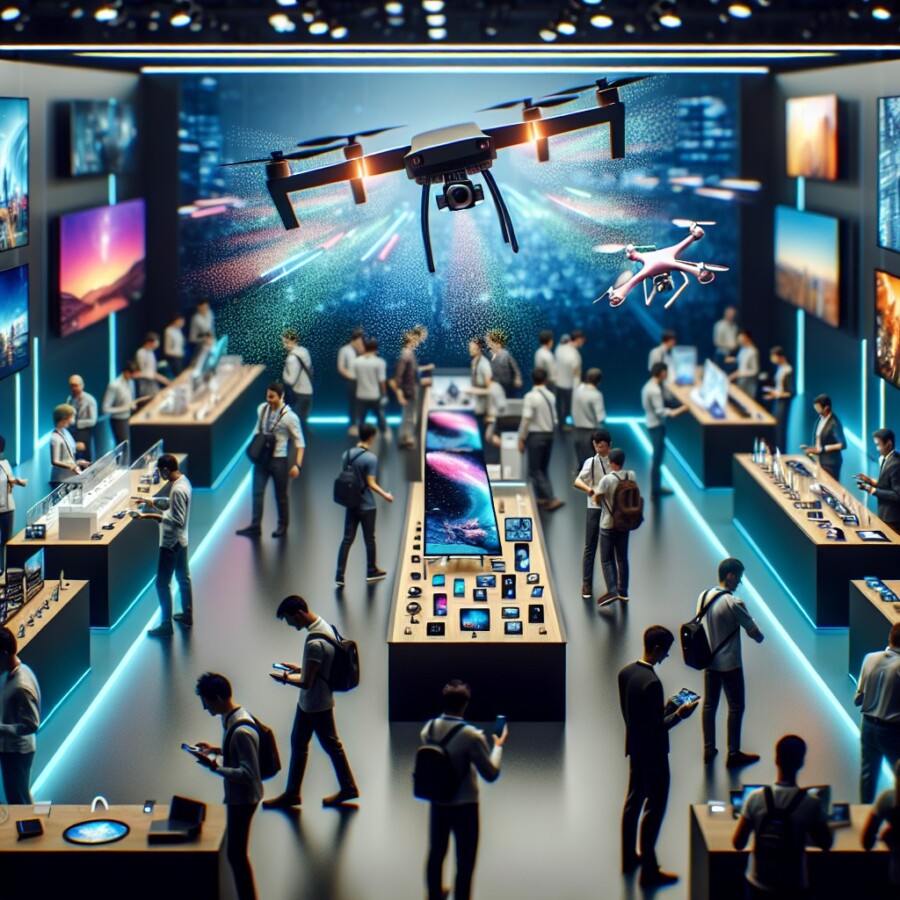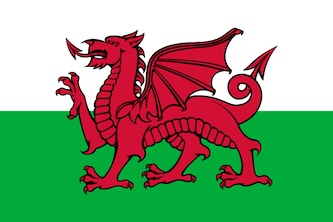At a big tech show called CES, people saw some new things that are supposed to be smart. One thing is a pillow that stops you from snoring by moving your head. Another thing is a vacuum cleaner that knows how much dirt there is and sucks harder if it needs to. But some people are not sure if these things are really as smart as they say or if the companies are just trying to make them sound cool.
The problem is that no one agrees on what “smart” or AI really means. Companies want to say their things are smart so that more people will buy them. But in America, a group called the FTC told companies they can’t lie about how smart their products are. It’s hard for people who buy things and for people who write about them to know if something is really smart or just pretending.
Even though everyone is talking about smart things, some companies don’t use the word “smart” a lot when they sell their stuff. There’s a new thing called Rabbit’s R1 that people really like, and it doesn’t say “smart” everywhere. Samsung has a fridge that tells you what to cook, and it’s smart, but do we really need our fridge to tell us what to eat? So, some people might not want to buy smart things for now.
Original news source: CES 2024: AI pillows and toothbrushes – is it all getting a bit silly? (BBC)
🎧 Listen:
Slow
Normal
Fast
📖 Vocabulary:
| 1 | tech | Short for technology, which is about new machines and equipment |
| 2 | snoring | The noise someone makes when they are sleeping and it’s hard to breathe |
| 3 | vacuum | A machine that cleans the floor by sucking up dirt |
| 4 | companies | Groups of people who make and sell things |
| 5 | products | Things that are made to be sold |
| 6 | FTC | A group in the United States that makes sure businesses are honest |
| 7 | pretending | Acting like something you’re not |
| 8 | Rabbit’s R1 | The name of a new product that people think is cool |
| 9 | Samsung | A big company that makes electronics like phones and TVs |
| 10 | fridge | A big box in your kitchen that keeps food cold |
| 11 | cook | To prepare food to eat by heating it |
| 12 | smart | Having the ability to do things that seem like magic or very advanced |
Group or Classroom Activities
Warm-up Activities:
– Vocabulary Pictionary
Instructions: Divide the class into small groups. Give each group a list of vocabulary words from the article (e.g. snoring, vacuum cleaner, smart, AI, etc.). One person from each group will come to the front of the class and draw a picture to represent one of the words, while their group members try to guess the word. The group with the most correct guesses wins.
– Headline Creation
Instructions: In pairs or small groups, have students create catchy headlines for the article. Encourage them to use vocabulary and phrases from the article. After a few minutes, have each group share their headline with the class and explain why they chose it.
– Speed Summarizing
Instructions: Divide the class into pairs. Give each pair a copy of the article. Set a timer for 2 minutes and have one student summarize the article to their partner as quickly as possible. After 2 minutes, have the pairs switch roles. Then, have them find a new partner and repeat the activity. Continue until students have had a chance to summarize the article to multiple partners.
– Think-Pair-Share
Instructions: Have students think about the following question: “Do you think smart technology is useful or unnecessary?” Give them a minute to think individually, then have them discuss their thoughts with a partner. After a few minutes, ask a few pairs to share their opinions with the class.
– Future Predictions
Instructions: In small groups, have students discuss and make predictions about the future of smart technology. They can consider questions such as: What new smart devices do you think will be invented? How do you think smart technology will impact our daily lives? After a few minutes, have each group share their predictions with the class.
🤔 Comprehension Questions:
1. What are two examples of “smart” things that people saw at the tech show?
2. Why are some people not sure if these things are really as smart as they say?
3. What did the FTC tell companies they can’t do?
4. Why is it hard for people to know if something is really smart or just pretending?
5. Do all companies use the word “smart” a lot when they sell their stuff?
6. What is something called Rabbit’s R1 that people really like?
7. What is one example of a smart thing that some people might not want to buy?
Go to answers ⇩
🎧✍️ Listen and Fill in the Gaps:
At a big tech show called CES, (1)______ saw some new (2)______ that are supposed to be (3)______. One thing is a pillow that stops you from snoring by moving your head. Another thing is a vacuum cleaner that knows how much dirt there is and sucks harder if it needs to. But some people are not sure if these things are really as smart as they say or if the companies are just trying to make them (4)______ cool.
The problem is that no one agrees on what “smart” or AI really means. Companies (5)______ to say their things are smart so that more people will buy them. But in America, a group called the FTC (6)______ companies they can’t lie about how smart their products are. It’s (7)______ for people who buy things and for people who write about them to know if something is really smart or just (8)______.
Even though everyone is talking about smart things, some companies don’t use the (9)______ “smart” a lot when they sell their (10)______. There’s a new thing called Rabbit’s R1 that people really like, and it doesn’t say “smart” everywhere. (11)______ has a fridge that tells you what to cook, and it’s smart, but do we really (12)______ our fridge to tell us what to eat? So, some people might not want to buy smart things for now.
Go to answers ⇩
💬 Discussion Questions:
Students can ask a partner these questions, or discuss them as a group.
1. What is a smart pillow and what does it do?
2. How would you feel if you had a vacuum cleaner that could suck harder when it needed to?
3. Do you think companies should be allowed to lie about how smart their products are? Why or why not?
4. Why do companies want to say their things are smart?
5. Do you think it’s important for things to be smart? Why or why not?
6. What is Rabbit’s R1 and why do people like it?
7. How do you feel about a fridge that tells you what to cook? Do you think it’s necessary? Why or why not?
8. Do you think people should buy smart things? Why or why not?
9. How do you decide if something is really smart or just pretending?
10. Have you ever used a smart device? What was it and did you like it?
11. Do you think it’s important for companies to use the word “smart” when selling their products? Why or why not?
12. How do you think technology will change in the future?
Individual Activities
📖💭 Vocabulary Meanings:
Match each word to its meaning.
Words:
1. tech
2. snoring
3. vacuum
4. companies
5. products
6. FTC
7. pretending
8. Rabbit’s R1
9. Samsung
10. fridge
11. cook
12. smart
Meanings:
(A) A big company that makes electronics like phones and TVs
(B) Things that are made to be sold
(C) To prepare food to eat by heating it
(D) Having the ability to do things that seem like magic or very advanced
(E) Groups of people who make and sell things
(F) The name of a new product that people think is cool
(G) A big box in your kitchen that keeps food cold
(H) A group in the United States that makes sure businesses are honest
(I) A machine that cleans the floor by sucking up dirt
(J) Acting like something you’re not
(K) The noise someone makes when they are sleeping and it’s hard to breathe
(L) Short for technology, which is about new machines and equipment
Go to answers ⇩
🔡 Multiple Choice Questions:
1. What is the name of the big tech show where people saw new smart things?
(a) CES
(b) ETC
(c) FTC
(d) CES Tech Show
2. What is one example of a smart thing mentioned in the article?
(a) A vacuum cleaner that knows how much dirt there is
(b) A smart fridge that tells you what to cook
(c) A pillow that stops you from snoring
(d) All of the above
3. Why do companies want to say their things are smart?
(a) To make them sound cool
(b) To confuse people
(c) So more people will buy them
(d) To make more money
4. What group told companies they can’t lie about how smart their products are?
(a) CES
(b) FTC
(c) ETC
(d) CES Tech Show
5. What is one reason some people might not want to buy smart things?
(a) They don’t want their fridge to tell them what to eat
(b) They think companies are just pretending their products are smart
(c) All of the above
(d) They don’t know what “smart” really means
6. What is the name of the new thing that people really like and doesn’t say “smart” everywhere?
(a) Samsung’s Smart Fridge
(b) Vacuum Cleaner
(c) Pillow
(d) Rabbit’s R1
7. What is one thing the Samsung fridge mentioned in the article does?
(a) Stops you from snoring
(b) Tells you what to cook
(c) Knows how much dirt there is
(d) None of the above
8. What is one thing the FTC told companies they can’t do?
(a) Lie about how smart their products are
(b) Sell smart things
(c) Use the word “smart” a lot
(d) All of the above
Go to answers ⇩
🕵️ True or False Questions:
1. One of the stupid things at CES is a pillow that encourages snoring by moving your head.
2. In America, a group called the FTC told companies they can’t lie about how smart their products are.
3. Another dumb thing at CES is a vacuum cleaner that has no clue how much dirt there is and doesn’t adjust suction power.
4. Companies want to say their things are smart so that more people will buy them.
5. At a big tech show called CES, people saw some new things that are supposed to be smart.
6. Some people might want to buy smart things for now.
7. Some companies excessively use the word “smart” when they sell their stuff.
8. Some people are not sure if these smart things are really as smart as they say.
Go to answers ⇩
📝 Write a Summary:
Write a summary of this news article in two sentences.
Check your writing now with the best free AI for English writing!
Writing Questions:
Answer the following questions. Write as much as you can for each answer.
Check your answers with our free English writing assistant!
1. What are two examples of “smart” things that were shown at the tech show?
2. Why are some people not sure if these “smart” things are really as smart as they claim to be?
3. What did the FTC tell companies about their products?
4. Are all companies using the word “smart” to sell their products? Give an example of a product that is liked but doesn’t use the word “smart.”
5. What is an example of a smart fridge? Do you think it is necessary for a fridge to tell us what to eat? Why or why not?
✅ Answers
🤔✅ Comprehension Question Answers:
1. What are two examples of “smart” things that people saw at the tech show?
– A pillow that stops you from snoring by moving your head.
– A vacuum cleaner that knows how much dirt there is and sucks harder if it needs to.
2. Why are some people not sure if these things are really as smart as they say?
– People are not sure because there is no agreement on what “smart” or AI really means.
3. What did the FTC tell companies they can’t do?
– The FTC told companies they can’t lie about how smart their products are.
4. Why is it hard for people to know if something is really smart or just pretending?
– It is hard because there is no clear definition of what “smart” means, and companies want to make their products sound cool so that more people will buy them.
5. Do all companies use the word “smart” a lot when they sell their stuff?
– No, not all companies use the word “smart” a lot when they sell their stuff. Some companies, like Rabbit’s R1, don’t use the word “smart” but people still like their products.
6. What is something called Rabbit’s R1 that people really like?
– Rabbit’s R1 is a new thing that people really like, but it doesn’t say “smart” everywhere.
7. What is one example of a smart thing that some people might not want to buy?
– One example is a fridge from Samsung that tells you what to cook. Some people might not want their fridge to tell them what to eat.
Go back to questions ⇧
🎧✍️✅ Listen and Fill in the Gaps Answers:
(1) people
(2) things
(3) smart
(4) sound
(5) want
(6) told
(7) hard
(8) pretending
(9) word
(10) stuff
(11) Samsung
(12) need
Go back to questions ⇧
📖💭✅ Vocabulary Meanings Answers:
1. tech
Answer: (L) Short for technology, which is about new machines and equipment
2. snoring
Answer: (K) The noise someone makes when they are sleeping and it’s hard to breathe
3. vacuum
Answer: (I) A machine that cleans the floor by sucking up dirt
4. companies
Answer: (E) Groups of people who make and sell things
5. products
Answer: (B) Things that are made to be sold
6. FTC
Answer: (H) A group in the United States that makes sure businesses are honest
7. pretending
Answer: (J) Acting like something you’re not
8. Rabbit’s R1
Answer: (F) The name of a new product that people think is cool
9. Samsung
Answer: (A) A big company that makes electronics like phones and TVs
10. fridge
Answer: (G) A big box in your kitchen that keeps food cold
11. cook
Answer: (C) To prepare food to eat by heating it
12. smart
Answer: (D) Having the ability to do things that seem like magic or very advanced
Go back to questions ⇧
🔡✅ Multiple Choice Answers:
1. What is the name of the big tech show where people saw new smart things?
Answer: (a) CES
2. What is one example of a smart thing mentioned in the article?
Answer: (c) A pillow that stops you from snoring
3. Why do companies want to say their things are smart?
Answer: (c) So more people will buy them
4. What group told companies they can’t lie about how smart their products are?
Answer: (b) FTC
5. What is one reason some people might not want to buy smart things?
Answer: (d) They don’t know what “smart” really means
6. What is the name of the new thing that people really like and doesn’t say “smart” everywhere?
Answer: (d) Rabbit’s R1
7. What is one thing the Samsung fridge mentioned in the article does?
Answer: (b) Tells you what to cook
8. What is one thing the FTC told companies they can’t do?
Answer: (a) Lie about how smart their products are
Go back to questions ⇧
🕵️✅ True or False Answers:
1. One of the stupid things at CES is a pillow that encourages snoring by moving your head. (Answer: False)
2. In America, a group called the FTC told companies they can’t lie about how smart their products are. (Answer: True)
3. Another dumb thing at CES is a vacuum cleaner that has no clue how much dirt there is and doesn’t adjust suction power. (Answer: False)
4. Companies want to say their things are smart so that more people will buy them. (Answer: True)
5. At a big tech show called CES, people saw some new things that are supposed to be smart. (Answer: True)
6. Some people might want to buy smart things for now. (Answer: False)
7. Some companies excessively use the word “smart” when they sell their stuff. (Answer: False)
8. Some people are not sure if these smart things are really as smart as they say. (Answer: True)
Go back to questions ⇧















